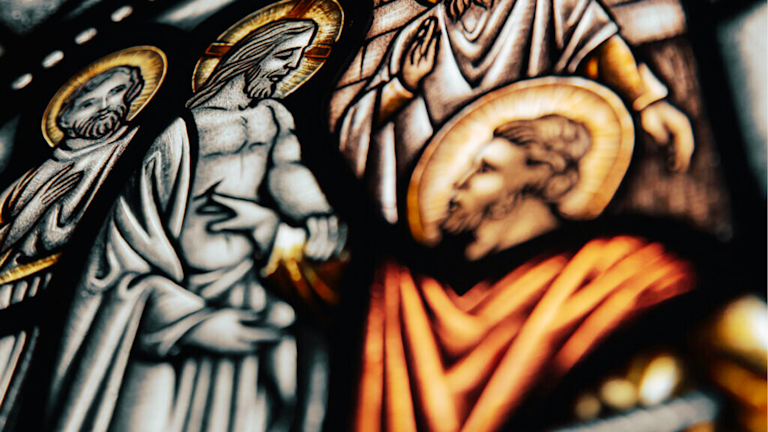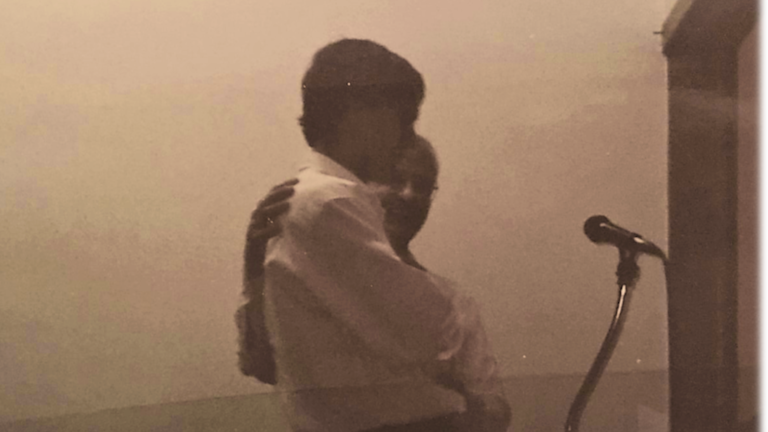May 31, 2024
It was my first time in the northern forests and mountains of British Columbia. I had finished my first year of college and I, like many people in Canada at that time, paid for my tuition by tree planting. I was on a crew of university students; one of them was a philosophy student. Within five minutes of our first introduction, learning I was a theology student, he posed to me a question: if God is so good and powerful, why is there such suffering in the world?

It reminds me of Ivan’s challenge to his brother, Alyosha, in The Brothers Karamazov. As the brother met at a tavern to talk, Ivan reveals to Alyosha that it is impossible to reconcile the idea of God and an eternal harmony, when there is nonsensical violence in the world.
In particular, Ivan is angry about the suffering of innocent children, "I want to see with my own eyes the hind lie down with the lion, and the murdered man rise up and embrace his murderer . . . But then there are the children, and what am I going to do with them? That is the question I cannot resolve" (The Brothers Karamazov, 244).
Needless to say, I had a lot to think about and discuss that summer as we planted trees in the northern wilderness of Canada.
Apologetics and Beyond
There have been many books written to argue for or against the existence of God. They have their place and purpose. Apologetics, as I understand it, is the rational response and defence to criticism of the Christian faith. Western theology, to some extent, stems from apologetic work, such as Origen’s response to Celcus, Augustine’s answer to the Platonists among others in The City of God, or Aquinas's Summa Contra Gentiles. It is the attempt to show the reasonableness of faith in God, or at least to consider the reality of God as a reasonable possibility.
Dostoevsky himself is not a traditional apologist, at least not in The Brothers Karamazov. Rather, he seeks to cast a poetic vision of the Christian God at work in the lives of his characters and, perhaps, as he himself experienced God, but in deep dialogue with and in answer to his own skeptical questions and doubts.
The immorality of the soul, the reality of “good and evil,” and the possibility of moral transformation and renewal is contingent on whether God really exists or not. Dostoevsky and Nietzsche both understood this. A central theme in both their work is this: if God does not exist, then “all things are permitted" (The Brother Karamazov, 649).
What things are then “permitted,” if we ourselves are the ones who determine our moral disposition? Are religion and societal law and custom the necessary illusions to help us weak humans ignore and suppress our terrible freedom? There are serious moral questions at stake, if God does not in fact exist. In light of suffering, if God does exist, at least there is the possibility both for a reason for it as well redemption.
We know that while detained in Siberia as a political prisoner, Dostoevsky was given the Gospel of John. He encountered Jesus in the Gospel, and this proved pivotal to the direction of his literary art. His depiction of Alyosha’s Christian mystical experience is meant to express the reality of redemptive vision for a suffering world.
The only appropriate response to the problem of suffering is found in the Messiah. As Alyosha answers his brother Ivan, "you asked just now if there is in the whole world a being who could and would have the right to forgive. But there is such a being, and he can forgive everything, forgive all and for all, because he himself gave his innocence blood for all and for everything . . . " (The Brothers Karamazov, 246).
But what is the sign that God has actually dealt with evil itself in Christ? The Resurrection.
The Sign of the Resurrection
The New Testament writings all presuppose the resurrection of Jesus. These writings would not exist, nor would the church, if this did not actually take place historically. That is, there was the fact of the empty tomb. Did the early disciples take and hide the body, inventing the myth of the resurrection? Unlikely; what advantage would they have in doing so? Why would they risk their lives for a publicly shamed, humiliated and crucified would-be Messiah?
On the contrary, according to Karl Barth, "Certainly the empty tomb cannot serve as a 'historical' proof . . . but it is, in fact, an indispensable accompaniment of the attestation," that Jesus had risen from the dead (Church Dogmatics, IV, 341).

In the Gospel of John even the early disciples are fearful, and some are skeptical at first, like Thomas, who doubted. He demanded evidence that Christ had indeed risen from the dead. Jesus appeared to him and revealed his scars, "put your finger here, and see my hands; and put out your hand, and place it in my side. Do not disbelieve but believe" (John 20,27).
Jesus appeared to others beyond the apostles as well, as the apostle Paul wrote, "he appeared to Cephas, then to the twelve. Then he appeared to more than five hundred brothers at one time . . . " (2 Corinthians 15,5-6).
If this is true that God raised Jesus from the dead, then he is truly the redemption and completion of our natural existence in the body–for all peoples, in all cultures, and for all nations. It is the verification that in this Jewish man, God provided forgiveness for all our human attempts to complete our natures–with all their longings and desires–in our own ways.
Moreover, bodily life is affirmed. As N.T. Wright stated, "The point of the resurrection…is that the present bodily life is not valueless just because it will die…What you do with your body in the present matters because God has a great future in store for it…What you do in the present—by painting, preaching, singing, sewing, praying, teaching, building hospitals, digging wells, campaigning for justice, writing poems, caring for the needy, loving your neighbour as yourself—will last into God's future" (Surprised by Hope).
God united the material and the eternal in Jesus. Our bodily life is affirmed and redeemed. A flame of hope burns in us now and for all eternity. The resurrection is the sign and seal of this truth. Through the Holy Spirit, God has placed this reality in the hearts and souls of those who are willing to receive this gift. A flame of hope burns in us now and for all eternity.
Transformation of Desire
I cannot say that my own personal experience with God, which proved transformative to me, actually proves the existence of God. This would be presumptuous arrogance. However, I can humbly assert that it does give witness to the reality of God.
Experience is a subjective thing. It cannot be verified through the scientific method. But it can certainly be included as a witness, such as when a jury is considering the truth of a case. Beyond that, there are broader effects of the experience: a transformation of character.
However, even a transformed life of good works does not prove the existence of God. In that respect, it would be presumptuous, even arrogant, to point to my own life. Still, something in me transformed in that moment, some new moral disposition. I now wanted to be good.
This does not mean that I actually was good. Yet, after my encounter with Christ, there was a clear transformation of desire. There was a new desire to reconcile with the Church, with people I had critically held at a distance. There was a new willingness to seek forgiveness from those I had hurt and offended in the past.
Like Alyosha, something “entered” me, connecting me to others, driving me to want peace, forgiveness, and reconciliation–not just with people, but with the wider creation and universe. I thirsted for peace and reconciliation.

One of the greatest evidences of the change that occurred in me is when I reconciled with my parents and indicated that I wanted to be baptised. Baptism is the public witness of our incorporation into the death and resurrection of Christ, an affirmation that we indeed have been touched by the Spirit of God, receiving grace and mercy in our lives. It is an active embodiment of the work of God in our lives and a sign of our greater membership in the body of Christ.
I swallowed my pride and confessed to them that I needed Jesus.
The Gift of Freedom
If I had the opportunity to speak again with my philosopher friend, I might talk about the evident moral freedom that God has given us. A freedom that is necessary for the possibility of relationship, love, and friendship. It is certainly not an absolute freedom. And our sense of morality is also influenced by cultural and social circumstances. But it is a limited freedom, nonetheless, that allows us to be the moral agents that can reflect the goodness of God, his love and faithfulness.
I would admit that God took a terrible risk in creating this limited freedom. This freedom is what Ivan's Grand Inquisitor detests and resents. As he questions "Christ," he maintains that the creation of human freedom was a divine mistake, "they in their simplicity and innate lawlessness cannot even comprehend, which they dread and fear - for nothing has ever been more insufferable for man and for human society than freedom!" (The Brothers Karamazov, 252).
According to the Inquisitor, we cannot comprehend or handle this freedom. Therefore, he suggests that what people really need is a religious political sovereignty that will remove their freedom and given them enforced peace that they long for, "they are depraved and rebels, but in the end it is they who will become obedient. They will marvel at us, and look upon as gods, because we, standing at their head, have agreed to suffer freedom and to rule over them - so terrible will it become for them in the end to be free!" (The Brothers Karamazov, 253).
Nonetheless, this (limited) freedom was God's sovereign choice, out of the desire he has to have relationship with us in his creation. The suffering, death, and resurrection of Jesus is our witness that God does not will our suffering. In solidarity with us, Christ suffered and died for us that we might experience the Creator's eternal love, planting within us an eternal hope, a tree of life.
In my own experience, the more I give access to God’s Spirit, the more persuaded that God intends good for each person. As I enter more deeply into his life of active love, just as Dostoevsky perceived, I also became more persuaded of his reality, the eternal love of the one who was crucified.
Read Part 8: Ecstasy for the Whole
Go to the series: A Transfiguration in Time.
Sources
Barth, Karl. Church Dogmatics: Doctrine of Reconciliation IV.I. Peabody, MA: Hendrickson, 2008.
Dostoevsky, Fyodor. The Brothers Karamazov. Translated by Richard Paver and Larissa Volokhonksy. New York: Vintage, 1990.
Suderman, Alex D. The Sacrament of Desire: The Poetics of Fyodor Dostoevsky and Friedrich Nietzsche in Critical Dialogue with Henri de Lubac. Eugene, OR: Pickwick Publications, 2022.
Wright, N.T. Surprised by Hope: Rethinking Heaven, the Resurrection, and the Mission of the Church.

